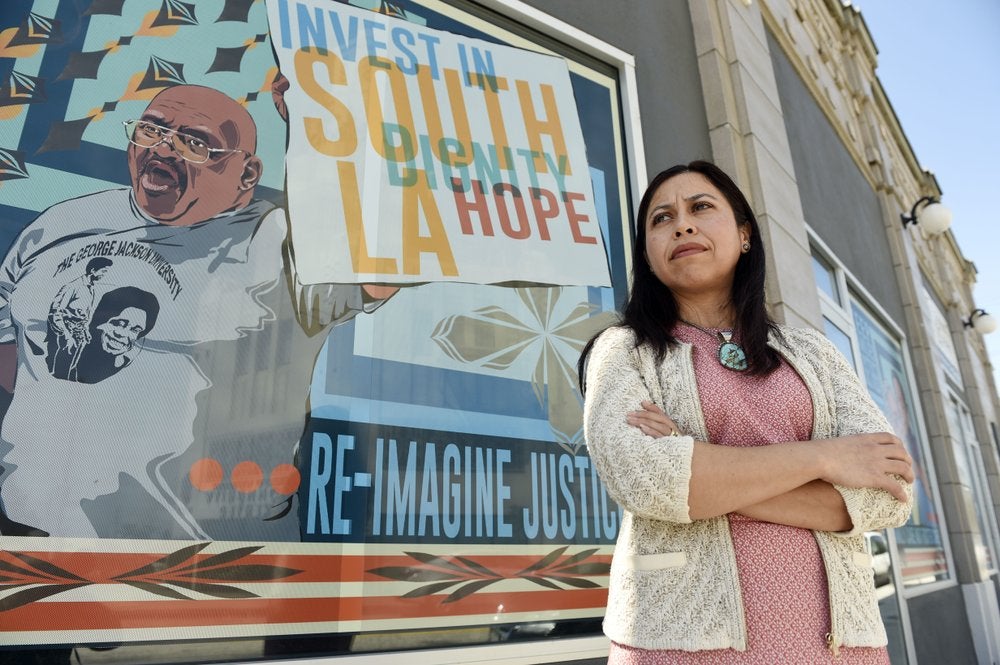LA riots: How the ‘uprising’ against an unjust system led one student to become a social activist
Interview: When Aurea Montes-Rodriguez returned from a school trip to DC, the National Guard was patrolling her streets

Your support helps us to tell the story
From reproductive rights to climate change to Big Tech, The Independent is on the ground when the story is developing. Whether it's investigating the financials of Elon Musk's pro-Trump PAC or producing our latest documentary, 'The A Word', which shines a light on the American women fighting for reproductive rights, we know how important it is to parse out the facts from the messaging.
At such a critical moment in US history, we need reporters on the ground. Your donation allows us to keep sending journalists to speak to both sides of the story.
The Independent is trusted by Americans across the entire political spectrum. And unlike many other quality news outlets, we choose not to lock Americans out of our reporting and analysis with paywalls. We believe quality journalism should be available to everyone, paid for by those who can afford it.
Your support makes all the difference.Aurea Montes-Rodriguez was a 17-year-old student and preparing for a school trip to Washington DC when the verdicts came back on four white officers charged with beating black motorist Rodney King.
Almost immediately, her neighbourhood in south central Los Angeles was convulsed by the not guilty verdicts, delivered by a jury that contained several people of colour but no African-American, and with the trial having been moved far from where the beating occurred.
The riots, events she considers a societal “uprising”, and their aftermath, convinced her of the need to work for her community, something she has been doing for several decades with the Community Coalition of South Los Angeles, a publicly-funded body that works to mentor students, lobby on policy, and work to improve better communication between the police and other groups – particularly people of colour.
She is now its executive vice president.
On the 28th anniversary of the riots, Montes-Rodriguez says she is struck more than ever by the racial inequalities in society as as result of the coronavirus pandemic.
“All of the anniversaries are important. But this 28th anniversary is really present in my mind because of the pandemic,” she says.
“I think that what became really important to us was connecting with everyone that we work with through our organising work. That’s a lesson we learned in the 92 uprising that is still true and even more critical today.”

A number of reports have highlighted how people of colour have been disproportionately infected and killed by the coronavirus, partly because of pre-existing bad health, or because of lack of easy access to healthcare once the virus struck.
She also draws a parallel to the large number of people of colour – again hugely disproportionate – who had been incarcerated at the time of the riots. Now, authorities in cities such as Los Angeles are failing to respond quickly to help release into the community those in jail and at high risk of becoming infected.
“We started calling on the county to de-incarcerate vulnerable residents who had underlying health conditions or are over 60, who didn’t have serious offences who are really there because they cannot afford to pay bail,” she says.
Asked about the structural racism that remains in place in 2020, she says: “It troubles me that the structural racism that existed before the 1992 civil unrest and still exists, is alive and well during this pandemic.”
She says even though the pandemic has shown society’s interconnectedness, it is overwhelmingly the poor and people of colour who work on the front lines, on public transportation systems, at grocery stores or delivering items to people who have the privilege of staying in their homes.
“And so it troubles me that this surge and the devastation to black and brown people during the pandemic is going to be disproportionate,” she says.
Five days after the riots, Montes-Rodriguez joined her classmates on that trip to the nation’s capital. When she returned, the National Guard was already on the streets of her home.
“It was that experience that resulted in me working as a community organiser, doing social justice work three decades later, right in my community. I am grateful I get to do the work that I do. Yet, I am both troubled and alarmed by what this pandemic and economic downturn will do for families in Los Angeles, for black and brown families in South Los Angeles. I am worried it’s going to take years and decades for us to rebuild.”
She says “race and equality” have to be at the centre of any conversations taking place about the response to the virus, and the longer-term recovery.
She adds: “The lesson we learned that is that residents have to be engaged, they have to be at the forefront of any decisions that are made by public leaders.”
Join our commenting forum
Join thought-provoking conversations, follow other Independent readers and see their replies
Comments